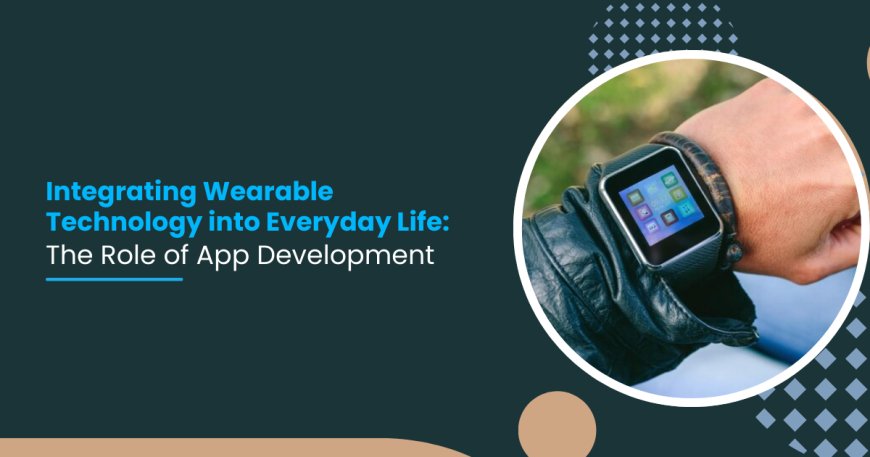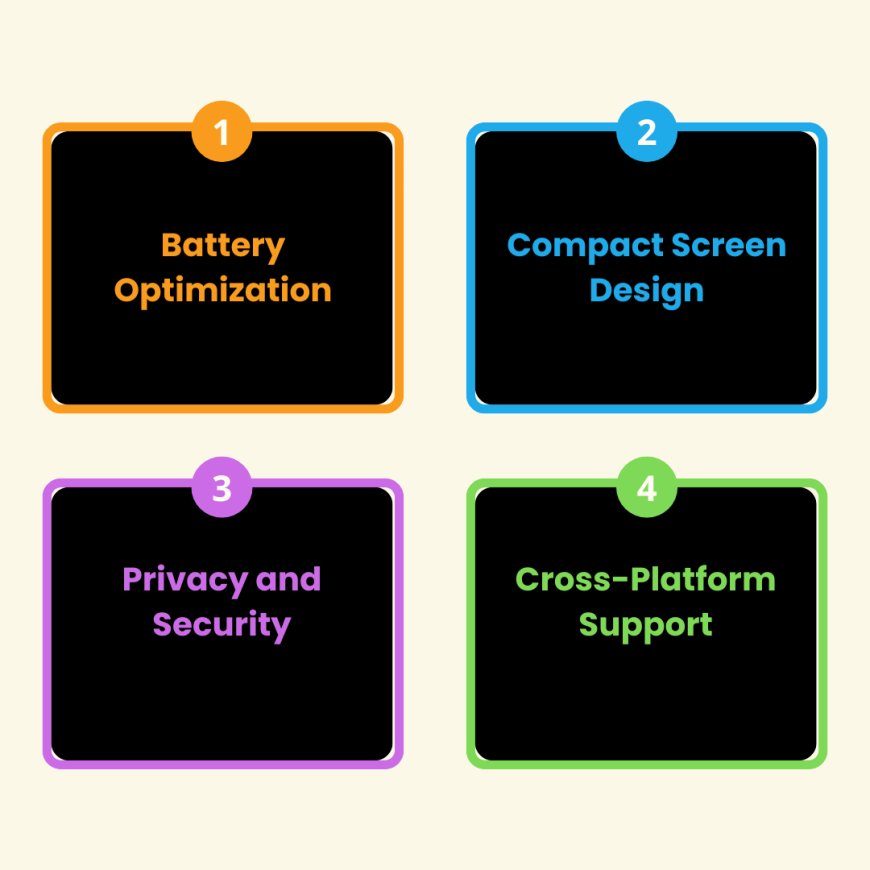Integrating Wearable Technology into Everyday Life: The Role of App Development
Explore how app development plays a key role in integrating wearable technology into daily life, enhancing user experience, health tracking, and convenience through seamless, intuitive applications.

Wearable technology has become an essential part of daily life. From fitness trackers to smartwatches, these devices have not only changed the way we interact with technology but also how we manage our health, productivity, and personal lives. In fact, according to Statista, the global wearable devices market is expected to reach $100 billion by 2025, showcasing their growing influence. As more people embrace these devices, the role of wearable devices app development becomes increasingly crucial in providing seamless and personalized user experiences. This article explores the role of app development in integrating wearable technology into everyday life and why choosing the right wearable devices app development company is key to success.
What Are Wearable Devices and How Do They Work?
Wearable devices are electronics that are designed to be worn on the body. These devices often include sensors that collect data about various aspects of the user’s activity or health, which is then transferred to an application on a smartphone or cloud service for analysis. The primary goal of these devices is to collect data to help users improve their daily habits, whether it be for fitness tracking, health monitoring, or even enhancing overall convenience.
Common Types of Wearable Devices
-
Smartwatches: These include popular devices like the Apple Watch, Samsung Galaxy Watch, and Fitbit, which offer a range of functionalities such as fitness tracking, notifications, and app integration.
-
Fitness Trackers: Devices like the Fitbit Charge or Garmin Vivosmart are designed primarily for monitoring physical activity and health metrics such as steps, calories burned, heart rate, and sleep.
-
Health Monitoring Devices: These wearables are focused on specific health concerns, such as continuous glucose monitors, blood pressure monitors, and even ECG monitoring devices.
-
Smart Glasses: Augmented reality glasses like Google Glass provide users with a hands-free display of information and interactive experiences.
The Role of App Development in Wearable Technology
Wearable technology would not be as effective without the apps that support them. App development is essential in ensuring these devices provide value to the user by processing data collected from sensors, offering real-time feedback, and providing meaningful insights. Without well-designed apps, wearables would only be able to collect data without offering much in terms of user experience or actionable results.
The Need for Seamless Integration
For a wearable device to be effective, it needs to work in perfect harmony with the app. Wearable devices app development ensures that the device’s software is capable of syncing seamlessly with the mobile application, providing real-time data updates, and offering users feedback that enhances their experience.
Customization and Personalization
One of the major benefits of wearable apps is the ability to offer a customized experience for each user. Whether it’s tracking a specific fitness goal, monitoring sleep patterns, or sending health alerts, the app needs to cater to the individual’s needs. Personalization is a key feature that increases user engagement and satisfaction, making them more likely to continue using the device.
How Wearable Devices Are Transforming Everyday Life
Wearables have gradually transitioned from a luxury to a necessity, particularly in health and fitness. They are now deeply integrated into various aspects of daily life, enhancing productivity, health, and overall convenience.
Health and Wellness Monitoring
Wearables provide an easy way to monitor health metrics like heart rate, calories burned, sleep patterns, and steps taken. These devices allow individuals to be proactive about their health, track improvement, and make adjustments to their routines based on real-time feedback.
Example:
Consider the Apple Watch, which not only tracks steps and calories but also provides a feature called ECG monitoring to detect irregular heart rhythms. Such features are life-changing for users with heart conditions.
Also Read: IoT in Sports: Improving Safety and Injury Prevention Through Wearables
Fitness Tracking
Wearables are becoming indispensable for fitness enthusiasts. They help monitor activity levels, track workouts, and measure progress over time. For instance, devices like Fitbit or Garmin not only track basic metrics like distance and steps but also offer advanced metrics like VO2 max, a measure of cardiovascular fitness.
Productivity and Convenience
Smartwatches and wearable devices are not limited to health and fitness monitoring; they also serve as productivity tools. Notifications, calendar reminders, and text messages delivered directly to your wrist help users stay organized and reduce the need to constantly check their phones.
Remote Health Monitoring for Chronic Conditions
Wearable devices have proven to be especially valuable for individuals with chronic health conditions, enabling real-time monitoring of vital statistics and alerting users of healthcare professionals to irregularities. Wearable devices app development facilitates the real-time processing of health data, allowing for quicker intervention when necessary.
Challenges in Wearable Devices App Development

Despite the growing importance of wearable technology, developing apps for these devices comes with its own set of challenges.
1. Battery Life Optimization
Wearable devices are limited by battery life, and apps need to be optimized to minimize battery consumption. Battery drainage can be a significant challenge when developing apps for wearable devices, as users expect to wear their devices throughout the day without frequent charging.
2. Small Screen Size
Wearable devices come with small screens, so it is essential to design simple, minimalist interfaces that allow users to quickly access necessary information without unnecessary complexity. The app must prioritize key features and display data in an easy-to-understand format.
3. Security and Privacy
Wearables collect sensitive health data, which makes data privacy and security crucial. Wearable devices app development companies need to implement robust encryption techniques to ensure that user data is protected against unauthorized access and breaches.
4. Cross-Platform Compatibility
Many users own more than one wearable device or mobile platform. Ensuring that apps are compatible across different devices, such as Android and iOS, is an important consideration during the development process.
Also Read: Exploring the Future of Wearable Devices App Development in Smart Technology
Key Features of a Wearable Device App
The following features are essential for any wearable device app to provide value to users:
1. Real-Time Notifications
Real-time alerts and notifications keep users engaged and help them take immediate actions based on the data collected by the wearable device.
2. Data Analytics and Insights
A good wearable device app will not only collect data but also analyze it and offer insights. Whether it’s tracking steps, monitoring heart rate, or analyzing sleep patterns, users need clear insights into their progress.
3. Fitness Plans and Goals
Fitness apps should allow users to set goals and track their progress. This feature promotes long-term engagement, motivating users to stick with their fitness journey.
4. Synchronization with Other Devices
For maximum utility, wearable apps must integrate seamlessly with other devices and apps, such as smartphones and health apps like Google Fit or Apple Health.
5. Customization
Personalization options allow users to tailor the app’s settings to their unique preferences, such as adjusting goal tracking or customizing notification settings.
Choosing the Right Wearable Devices App Development Company
Developing an effective wearable app requires specialized knowledge and experience. Selecting the right wearable devices app development company is essential to building a functional and engaging app. Here’s what you should look for:
1. Experience with Wearables
A company that specializes in wearable devices app development will have a deep understanding of the unique challenges these devices pose, including power management, sensor integration, and limited screen size.
2. Cross-Platform Development Skills
Ensure that the company has expertise in developing apps that are compatible across various platforms, including iOS, Android, and specific wearable devices like Apple Watch, Fitbit, and Samsung Galaxy Watch.
3. Strong UX/UI Design Capabilities
Given the small screens of wearable devices, excellent user interface (UI) and user experience (UX) design are crucial. Choose a company with a proven track record of creating clean, intuitive designs.
4. Security Expertise
Given the sensitive nature of health data, choose a company that prioritizes data security and ensures compliance with regulations like GDPR and HIPAA.
5. Ongoing Support
Look for a company that offers post-launch support, including regular updates and bug fixes to ensure your app stays functional and secure.
Conclusion
The integration of wearable technology into everyday life has changed the way we monitor health, stay productive, and engage with technology. As the market for wearable devices continues to grow, the role of wearable devices app development becomes even more crucial. The right app can turn a simple device into a powerful tool for improving health, fitness, and productivity. Choosing the right wearable devices app development company ensures that your app is not only functional but also secure, user-friendly, and personalized. With the right app development partner, you can create wearable technology solutions that enhance the user experience and meet the demands of a tech-savvy, health-conscious population.
What's Your Reaction?























